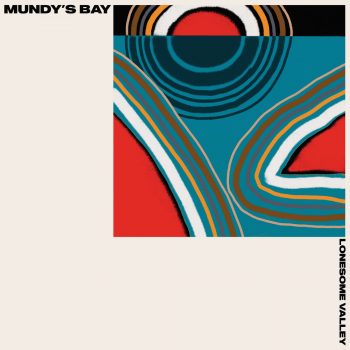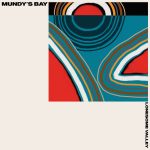Mundy’s Bay breathe life in the postscript world of post-punk and dream pop with their debut album ‘Lonesome Valley,’ showcasing smart songwriting that works.
Stream: ‘Lonesome Valley’ – Mundy’s Bay
Lonesome Valley is a record that any dream pop fan should hear, and here is why: It recalls Sonic Youth and DIIV riffs; it speaks to fans of Metric, Teagan and Sara, Stars, Lush, Wire post-Television with a prettier sonic, pantomimes an upbeat Slowdive; channels The Smiths without all the existential chaos that made them The Smiths; and percuss like Blondie without all the autotune provocateurism. Not to deprive them the right to call their product popular art, but their art only scratches a surface that DIIV has wailed upon for three records in a row and still comes out forever more polished and new-millennium. It would be more right to sub-categorize Lonesome Valley as dream pop than noise, but it would be a greater wrong to deny that the lexicon isn’t there for this Montreal five-piece.
The lineage from both new wave and no wave, reformation and counter-reformation, yin and yang, conspires within Lonesome Valley and Mundy’s Bay, whether cutting edge or behind the curve on a circle, have written superbly balanced cuts well worth more than comparisons.

The production is solid on the drums and guitar sound- that cannot be denied- but it falters when portraying the limited synthesizers or synthesizer effects (the Talk Talk lazer during the chorus of “Goodbye” comes to mind here). It can be heard but it seems the engineer would rather it weren’t. This solid single chord texture compliments the thrashing chordwork of John Donelly, Victor Beaudoin. Similar textural distorted phrases and industrial phases are inserted as Easter Eggs, but only as such. Considering how well timed these little asides are and how rarely they crowd the cuts, this is kind of a shame.
I can hear your whisper in the rain outside
Counting your voice every drop at a time
I’ve never been so low
– “Visions of You“, Mundy’s Bay
The question is would the synthesizers detract from what is, as sold, a wholly post-punk affair with dream pop impulses? The answer might be yes, but only if they were indulged at every turn. Mundy’s Bay err on the side of caution instead, which while depriving major twists in the music, delivers an LP with peerless consistency. This is the other side of “sameness,” on which face the coin lands can depend according to the day. For Lonesome Valley, however, the record is worth two listens, the time changes, instrumental breaks, vocals and Easter Eggs vary the tracks in subtle ways, hinting of shoegaze, noise, post-rock and industrial.
This would not be possible without such synthesizer or synthesizer effects and allows for an instrumental launchpad from which the group can expound into new projects. While paced as a post-punk record, there is considerable attention given as to how each song develops and is composed to prevent blitzkrieg fatigue; listeners can count on the record to provide non-guitar textures parceled between the scheduled break downs into heavy guitar-based sections. Hell, even the guitar interplay manages to play slow over faster tempos, reducing sonic density. Most importantly, because the time signatures dance between mid- and fast-tempo cuts, the music sounds fresh while remaining familiar. Further, it is not a record that seeks to overstay its welcome, ending at forty minutes.
Finally, can we just talk about the artwork? A cross between color-field painting and monochrome tableau work, Esther Mulder’s artwork is tasteful mixture of Vassily Kandinsky’s blue from Soft Hard and Kenneth Noland’s concentric forms from Beginning.. Nothing screams a well-executed record like the artwork; this is not to say the twelve-by-twelve or five-by-five square forecasts good music but that when the two reveal interdisciplinary harmony. The product becomes more than just melody-building or iconography and transforms into a piece of popular art, an audiovisual œuvre synthetique displaying the central artistic axiom in modern consumerism: solid music, solid image, solid product, solid art. Album artwork, especially in long-player format, is a record seller and an identifier; abstract art, in tandem with music, explains facets of the music without a word, bind theme into shape, colour, form and image.Mundy’s Bay works as a digestible piece of post-punk music dabbling in shoegaze relative just as its artwork functions as a piece playing in geometric abstraction and minimalist patterns.
‘Cause heavens close when you’re around
You lift me high above the ground
I can almost taste it in my mouth
– “Heaven’s Close”, Mundy’s Bay
However, concealed behind what makes for great artistic and musical tones are notoriously indie lyrics; an unabashed display c-side Morrisseyisms (still better than Morrissey’s current isms). It’s not that the choruses are not powerful, they are by the grace of Mulder’s voice, it’s that the bridges and small verses are rote fodder that pale in comparison to the guitar work. Unrequited love is a powerful conceit and a terrible pastiche. Indie rock lyrics often sink headfirst into the quagmire that is love found, lost, scorned, remembered, deified, etc. Should it be demanded that Mulder write like a modern day Sylvia Plath? No, but there are clear areas where Mundy’s Bay must improve many fold.
Still, the first time listening to Mulder sing “Visions of You” through the climax imposed an emotion I can only associate with seeing Alexander Calder’s mobiles for the first time.
Amid the varied pop art in a miniature museum, I saw red sculpted shapes that transcended time, canvas, iconography as they rotated in the breeze; there was no momentary openness, in fact, I hazard to say barricades to enjoyment had been formed in the short time between knowledge and experience.
But when the mobiles began to spin and Mulder began to sing, adult prejudice melted in childlike wonder, and from low the spirit was raised on high.
— — — —
Connect to Mundy’s Bay on
Facebook, Twitter, Instagram
Discover new music on Atwood Magazine
? © 2020
Lonesome Valley
an album by Mundy’s Bay









